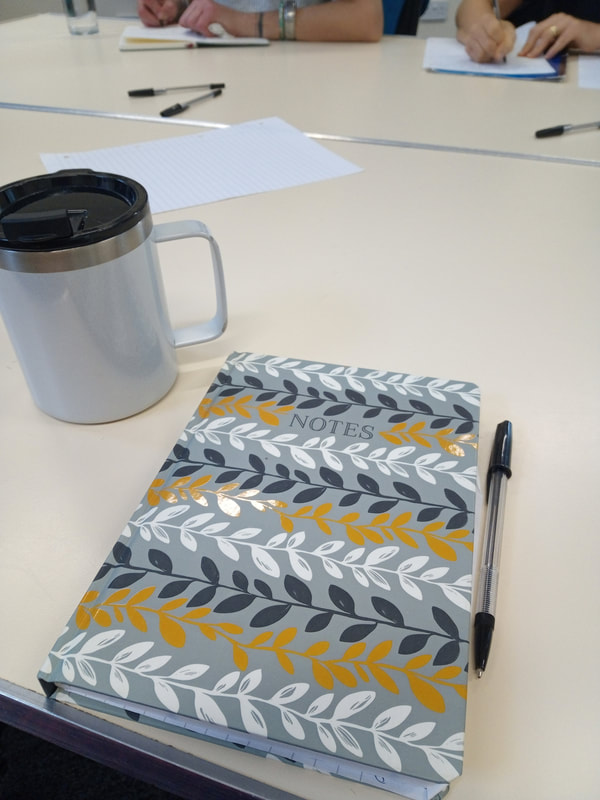|
I’ve had the pleasure of facilitating some writing workshops recently, in conjunction with Arkbound, at a drop-in café in Bristol called The Wild Goose/InHope for people affected by homelessness or adversity. There were 8 weekly drop-in sessions, alternating with another facilitator each week, and we were flexible and adaptable with the content to suit attendees' needs. This meant having plenty of writing exercises up our sleeves, some of which I’d like to share with you here. It was an honour to be part of the workshops and meet some amazing people and hear some great stories. Writing can be so helpful for mental health and wellbeing - it has certainly helped me! It provides an outlet, can aid reflection, and in a group it can build connection and help feelings of isolation and loneliness. For me, performing my work to an audience at storytelling events (such as the one I co-run with my writing group - Talking Tales) helped me build confidence and feel part of a community. My experiences As somebody who has written a lot myself – journalling, short stories, novels, screenplays, blogs/articles etc - I truly believe that writing is therapeutic in all of its forms. We channel parts of ourselves into writing, whether we realise it or not. There are many things I’ve written where I was adamant it wasn’t about me, but it so obviously was! Even when writing fictional characters that weren’t like me, I was still drawing on my own emotions, which provided a powerful way of processing. I probably didn’t even realise this at the time but now as a qualified counsellor, I understand more about myself, my past and my emotions. I also recognise that I was a child who often felt unheard and like I didn’t fit in, and the process of writing something I thought might be read by others was important. This is why blogging about certain topics also became important to me. It led me to reading and learning a lot more about social inequalities, eating disorders, body acceptance, diversity etc, which a critical part of my practice. The exercises I’ll share here are ones I’ve tried personally and/or use in groups. They may not be of use or interest to everyone, so just go with whatever you’re drawn to. The most important thing about writing, in my view, is to write whatever and however you like. Do it for yourself, not to fit in what others say or to abide by rigid writing rules. Letter to your younger self A writing exercise I found helpful in the past was writing a letter to my younger self. This can be a very emotional exercise but can help build self-compassion and recognise how far you’ve come. It may help you build more understanding of things from the past, or perhaps help forgive yourself for something. When I did this exercise I started with some jokes about being “Mel from the future”. I felt awkward doing it and didn’t know how to start! But as I continued writing, I realised how much I wanted to reassure younger me that things would be okay, and that not all people treat others very nicely but that isn’t younger me’s fault. To do this exercise you might want to pick a certain age in your life that you’re writing to, perhaps that might be somewhere in the teenage years or younger. Be sure to do this at a time when you’re comfortable and calm, with some time for yourself after as it can bring up a lot. Pivotal moments We all have moments in our lives that shape us and what we’re doing. Consider writing about a “coming of age” experience in your life, or a pivotal moment in your past. Something, someone or an experience that inspired you in some way or provoked a change of some kind. It might have been a “sliding doors” moment that took your life off in a different direction. If you want to write fiction, this can be a good starting point for a “what if?” For example, what if you didn’t move away, take that job, go on a date with that person etc. Try not to dwell on any regrets here, but instead think about what can be learnt and reflected on. Arguably there are no mistakes, just opportunities for growth. A pivotal moment can often make for an opportunity for reflection years later, to recongise how far you’ve come, to see how you’ve changed and if you feel differently about it now. Burn your critical thoughts Write down your critical thoughts, the narrative that says you “should” do this, that you’re too stupid/ugly etc, that you’re useless and nobody likes you. Try writing those out on strips of paper, then either burn them and watch them dissolve, or (a potentially safer option) rip them into tiny pieces. Alternatively, you can write the thoughts down and then write an alternative thought instead. Respond to yourself the way a positive family member or friend. The unsent letter Feeling angry or upset with someone? Got something to say to someone but never had chance to say it? Writing a letter to someone, completely letting rip, and then not sending it, can be a really cathartic way of getting your anger and emotions out. It might be that you’re a bit frustrated with your boss so you might want to type out an email of what you would say – BUT DON’T put your boss's email in the address bar in case you actually send it – eek! Or you may want to write a physical letter to someone who has hurt you. This can then be kept if you wish, or ripped up or burnt if you feel that may be helpful as a “letting go” process. This exercise can also be used when a friend or relative has passed away, for when you wish you could have said something to them, or need to say goodbye. 15-minutes of writing, and re-writing, and re-writing! The idea with this exercise is that you start with something that’s bothering you, or a problem you’d like to figure out, and with each re-write you might find a bit more clarity. When I’ve done this in the past, I’ve found it gets shorter each time, and I found that the problem didn’t seem that much of a big deal by the end.
Journalling There are lots of ways to journal so don’t worry if you get a bit nervous at the sight of a blank page. You’re not writing it for anyone else (but if it helps to picture someone to write for then go for it!) I fancied myself as a bit of a Bridget Jones when I started journalling, many years ago, and used to write like I was trying to entertain an audience. It gradually became more emotional and honest over the years as I got into it. I don’t write very often now, usually when I need to get something out or process something. I also write when I’m travelling – I have books full of journalling from when I was travelling, though many of the parts from South East Asia and India mainly just involve me going on about my bowel movements! Find your own way of journalling, be that notes, bullet points, with doodles etc. Even if you don’t know where to start, you can literally start with “I don’t know what to write and this is feeling kind of awkward and silly…”. You might be surprised where it goes from there. But if it doesn’t then, that’s okay too, just be kind to yourself maybe try another time. Life writing and memoirs Writing about childhood can be helpful for many people, and writing about family and experiences. It can be a lovely way of leaving a legacy, even if it’s only for a few family members to read. If you ever think “my life is too boring to write about” then just notice that as a critical voice and be assured that everyone has a life that’s worth writing about, you don’t have to have been to exciting places or broken a world record. Everyone has the ups and downs, and the relationships and the relationship breakdowns – this is the human part which people want to hear about. Just be aware that a lot of things can come out when writing about traumatic things in the past. Because writing something down is sometimes easier than saying it out loud, there might be some things you buried deep and this might unearth them. This may be helpful, or it can re-traumatise potentially. It can be a good idea to do this whilst having counselling sessions if this is the case so that you can process these feelings safely. A final note When I started writing, I spent a long time trying to make it perfect for others to read. This was something I did in other aspects of life too, not just when writing. The perfectionist critical voice would start jabbering on, “this is rubbish, nobody wants to read this!” I couldn’t make that go away, that was deep-rooted from childhood, but I gradually listened to it less and less. Noticing it, naming it as a critical thought and knowing that I didn’t need to listen to it helped. If you’re writing to try and get published, don’t worry about trying to make it perfect and tidy until much later on, this kind of focus will only distract you in the early stages when openness, creativity and flow are more important. You don’t have to use big clever words, or have perfect grammar or spelling (luckily there are things like Grammarly which can help you with that), so just tell your truth. Even now writing this, I know it won’t be perfect, but I don’t care. If you’ve made it this far I hope you’ve found this helpful. So now, as I help others in writing workshops, I very much remember that I am not an expert, I am not perfect, but “good enough”…and so are you! Happy writing!
0 Comments
Leave a Reply. |
Categories
All
Archives
June 2024
|


